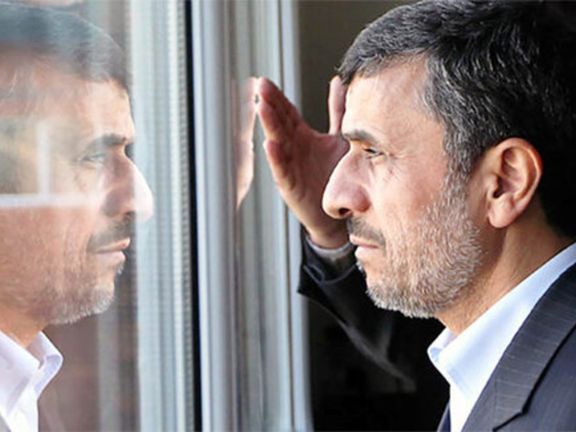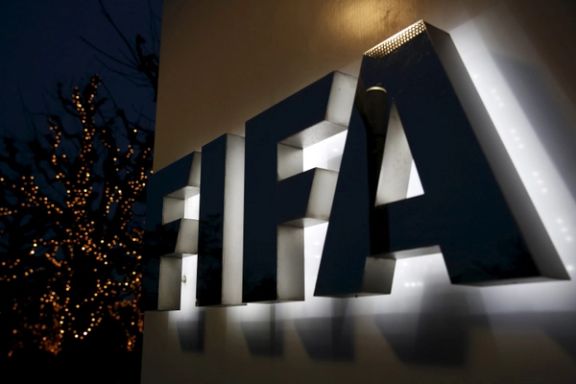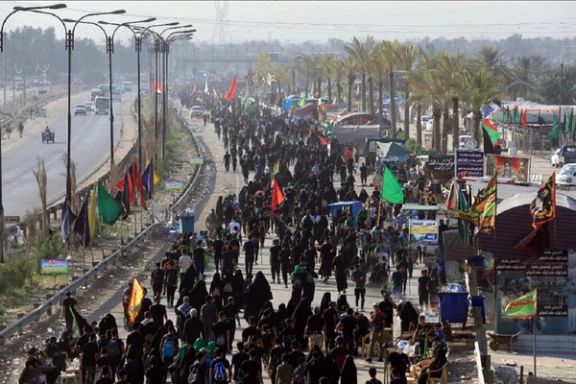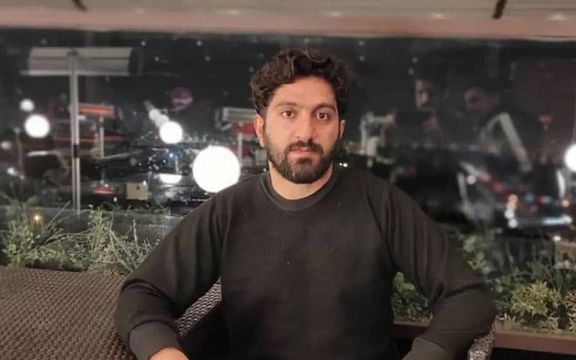Ahmadinejad Eyes A Return To Office, Former Aide Says

A former adviser to Iran’s ex-president Mahmoud Ahmadinejad said that the controversial politician might consider running for president or accept the vice presidency in the future.

A former adviser to Iran’s ex-president Mahmoud Ahmadinejad said that the controversial politician might consider running for president or accept the vice presidency in the future.
Ahmadinejad’s main goal is to run for the presidency in 2025, Abbas Amirifar stated, adding, “His perception, even his delusion, is that the government has failed to control inflation and high prices, so the system has no other way but to stand behind him” and back his candidacy.
According to Amirifar, if Ahmadinejad registers as a presidential candidate, the Guardian Council will definitely disqualify him in the vetting process because “the system no longer trusts him.”
In the case of disqualification, he may support some of his allies, such as Gholamhossein Elham and Abdolreza Sheikholeslami, during the presidential campaign and may even accept the vice-presidency in an attempt not to fade away from Iran’s political scene, Amirifar went on to say.
Amirifar, a cleric, was once recognized as Ahmadinejad’s exorcist. He also served as the head of the cultural council and the cultural advisor during Ahmadinejad’s 8-year presidency.
Amirifar later distanced himself from Ahmadinejad as the populist figure incurred the wrath of Supreme Leader Ali Khamenei and was removed from his inner circle.
Abdolreza Davari, another of Ahmadinejad’s former aides, claimed in December that Sadegh Mahsouli, the leader of Iran’s ultra-hardliner Paydari Party, is paving the way for the return of the former president to politics.
In an interview with the IRGC-affiliated Fars news agency, Mahsouli praised Ahmadinejad, calling him “charismatic” and a person with “innate management capabilities” and a good command of many things, including the economy and diplomacy.
The Guardian Council barred Ahmadinejad twice from running in Iran’s presidential elections in 2017 and 2021.

Iran has called on the International Association of Football Federations (FIFA) to ban Israel from international competitions over the war in Gaza, Iranian state media reported.
In a letter sent to FIFA, Iran’s Football Federation accused Israel of committing war crimes and killing civilians in Gaza, including football players, coaches and referees. The military operations in Gaza have annihilated “countless sport facilities” and football infrastructure, the letter further added.
Urging the full suspension of Israel’ football team, Iran’s Football Federation said such a “brilliant and enduring” move can pave the way for the cessation of Israel’s military campaign and the delivery of humanitarian aide to Gaza.
Israel already allows hundreds of trucks to deliver humanitarian assistance to Gaza daily.
Iran-backed Hamas invaded Israel's border regions on October 7 in what was the most deadly single day for Jews since the Holocaust. The Iranian government immediately praised the invasion and ordered street celebrations, with large banners erected within hours, suggesting Tehran had known in advance of the attacks which killed 1,200 mostly civilians and saw 240 taken hostage to Gaza.
Since then, Israel's relentless retaliation and the US support for its right to defend itself has led to Iranian proxy attacks on US interests. Though Iran has avoided any direct military involvement in the Israel-Hamas conflict, the regime has used its proxy groups, such as Yemeni Houthis and Hezbollah, to attack Israeli and American targets in the region.

New revelations emerged about Iran’s clandestine activities in the West, as the Daily Mail reported on Friday that Tehran is recruiting British Shias to spy on Jews and dissidents in the UK.
Citing Israeli and British officials, the report said that IRGC agents approach British Muslims visiting holy Shia sites in Iran and Iraq to recruit them for espionage purposes.
“They are told to return to the UK and gather information on prominent British Jews or targets such as synagogues,” as well as regime opponents the report added.
Kasra Aarabi, of the United Against Nuclear Iran advocacy group, remarked that the IRGC has focused on employing British Muslims mostly originating from Lebanon, Iraq and Pakistan because UK-based Iranians are usually secular and anti-regime and thus, will not cooperate with Tehran’s malign schemes.
Aarabi referred to annual Arbaeen religious mass gathering in the holy Iraqi city of Karbala as an occasion in which the IRGC recruiters are very active as the event gathers annually up to 20 million Shia pilgrims from around the world. Approximately 400,000 Shia Muslims live in the UK.

Following Hamas’ October 7 onslaught, Israel has repeatedly warned the UK against the potential attacks by the Iranian regime and its proxies on British soil, an Israeli official announced. Back in October, it was also reported that Iran’s agents were stirring up unrest in the UK through Gaza protests.
Daily Mail added that according to experts, some Iranians who have entered the UK apparently on student visas are in fact the regime’s spies.
“We do not know the scale of Iranian agents inside Europe and the UK, but all it takes is for one to slip through the net,” Daily Mail quoted an unnamed source as saying.
Meanwhile, a British government official confirmed that the IRGC has resorted to UK-based organized criminal networks when it intended to murder or kidnap its targets on British territory. According to Daily Mail, the IRGC has adopted such a policy as it is very hard for Iranian spies to operate freely in the UK.
In an interview with Iran International TV, political analyst Damoun Mohammadi called on European states to adopt a tougher stance with regard to Tehran’s conspiracies against Iranian dissidents abroad, warning that Europe’s inaction can result in the success of the regime’s plots to intimidate its opponents.
According to the analyst, the Islamic Republic has been targeting its opponents in European countries since it came to power in 1979 but it has recently increased its malign operations as the activities of the foreign-based dissidents have expanded significantly.
UK’s ITV revealed in December 2023 that the IRGC was plotting to assassinate two Iran International television anchors in London in 2022 amid Iranian anti-government protests.
Following ITV’s report, British Foreign Secretary David Cameron summoned Iran’s chargé d’affaires. Iran must be sent “an incredibly clear message that this escalation will not be tolerated,” Cameron stressed.
Last year, Iran International temporarily relocated its television broadcast from London to Washington, DC, due to terrorist threats. The decision to suspend Iran International's broadcasting from the British capital was made after the arrest of an Austrian national named Mohammad-Hussein Dovtaev on February 13, 2023.
He was detained while filming outside the network’s premises. The Central Criminal Court of England sentenced Dovtaev to 3.5 years behind bars for attempting to collect information “likely to be useful to a person committing or preparing an act of terrorism.”
In October 2023, Ken McCallum, the Director-General of MI5, the UK’s security service, stated that amid the war between Iran-backed Hamas and Israel, the Islamic Republic may be exploring new ways to threaten the security of Britain.
“Iran has been a rising source of concern and a rising source of task for MI5 over the last 18 months or so in particular,” McCallum then said.

Amidst mounting concerns over the fate of detained protester Reza Rasaei, Amnesty International issued a warning to Iranian authorities regarding his imminent execution.
Rasaei, who denies any involvement, faces the specter of death following his conviction in connection with the killing of an agent during a protest in Kermanshah province, on November 18, 2022.
The Iranian state media identified the agent as a member of the Revolutionary Guard, further complicating Rasaei's case. In addition to the disputed murder charge, Rasaei has been sentenced to one year in prison and 74 lashes for "disrupting public order."
Emphasizing the grave injustice surrounding Rasaei's trial, Amnesty International has called for immediate action from the Iranian regime. The organization asserts that Rasaei's death sentence was handed down following a severely unfair trial, marked by coerced confessions.
In a statement issued on Friday, Amnesty urged Iranian authorities to “immediately halt any plans to carry out Rasaei’s execution and quash his conviction and death sentence and release him unless he is charged with an internationally recognizable criminal offence and is given a fair retrial without recourse to the death penalty excluding torture-tainted confessions.”
The statement further implored Iranian authorities to ensure his access to his family, legal representation, and adequate medical care. Additionally, Amnesty called for measures to protect Rasaei from further torture or ill-treatment and urged an investigation into his allegations of torture, with perpetrators brought to justice through fair trials.
Rasaei's case highlights broader issues facing Iran's marginalized Kurdish and Yarsan ethnic and religious minorities. Yarsan adherents, including Rasaei, have faced ongoing challenges, including difficulties in registering their religious affiliation, restrictions on constructing places of worship, and fears of persecution for practicing their faith.

Iranian Foreign Minister Hossein Amir-Abdollahian during his visit to Lebanon has met with Hezbollah leader Hassan Nasrallah, as tensions rise with Israel on the Lebanese border.
Hezbollah published images from the meeting, which occurred at an undisclosed location.
Hezbollah indicated that the two discussed developments in Gaza, the conditions in southern Lebanon—where Hezbollah engages in daily exchanges of fire with Israel along the border—and other fronts within the "axis of resistance."
Iran provides significant support to Hezbollah, as well as several other groups in the region designated as terrorist organizations, including Hamas and Islamic Jihad in Gaza, and the Houthis in Yemen.
Amir-Abdollahian also had a meeting with Lebanese caretaker Prime Minister Najib Mikati in Beirut.
Iran's foreign minister, upon his arrival in Beirut on Friday, pledged continued support for the militant Hezbollah group, emphasizing the interdependence of Lebanon's security with that of the Islamic Republic and the wider region.
Amirabdollahian received a warm welcome from representatives of Lebanon's Hezbollah, as well as the militant Palestinian groups Hamas and Palestinian Islamic Jihad.
Hezbollah resumed attacks along Lebanon’s border with Israel on October 8, breaking 17 years of relative calm. The action followed a day after Hamas initiated its attack on southern Israel, which sparked the ongoing conflict. Hezbollah officials have stated that they will cease their attacks on Israeli military positions once Israel's offensive in Gaza comes to an end.
Amir-Abdollahian told reporters at Beirut’s Rafik Hariri International Airport that Iran will continue “its strong support to the resistance in Lebanon, as we consider Lebanon’s security as the security of Iran and the region.”

Iran-backed armed groups in Iraq announced Friday that they will resume attacks on US forces in response to the targeted killing of a senior militia figure earlier this week.
Wisam Mohammed Saber al-Saedi (aka Abu Baqer) was killed by a US drone strike in Baghdad Wednesday, reportedly for his role in the drone attack on a US base in Jordan that killed three American soldiers and wounded forty more.
In a statement Friday, the umbrella group of Iran proxies, Islamic Resistance in Iraq (IRI), said the killing of Abu Baqer “violated all the rules of engagement” and proved that the Americans only understand the “language of weapons.”
Iran-backed groups, including Abu Baqer’s Kataib Hezbollah, had announced a suspension of attacks against US troops following the large-scale retaliatory strikes by the US military on dozens of targets in Iraq and Syria on February 3. The decision, they claimed, was made not to embarrass the Iraqi government any further. But the pledge for a unilateral ceasefire didn’t last long.
“The opportunity of the past few days revealed with certainty to the Iraqi people, friends, and responsible authorities, that the occupying enemy does not abandon its meanness and treachery, and does not understand anything other than the language of weapons,” the IRI said in their statement.
The fight will now continue until the Americans are “expelled from the country,” it added, “forced to submit and be defeated”.
The IRI announcement seems to validate assessments that the US retaliatory strikes would likely fail to end the conflict unless it inflicts pain on Iran’s IRGC and forces it to pressure its proxies to stop.
Biden critics have repeatedly warned that his reluctance to confront Iran would further embolden the regime to push its malign adventures to the limit, getting to a point where the administration is left with no choice but to use even more force than what could have established deterrence and prevented escalation at an earlier stage.
“The fact that we had three servicemen killed is a failure of deterrence,” former US Special Operations Commander Gen. Tony Thomas told CBS. “Clearly, our adversary wasn’t getting the message that we weren’t going to tolerate that… I don’t know the measures so far have sent that message, and certainly with five days of telegraphing that we’re going to do something, and also with the caveat that we don’t want this to boil over into a bigger event –I think that’s your hold card. You don’t say that going into it.”
The Biden administration waited five days before responding to the deadly drone attack on the US base in Jordan, all the while speaking of its intention to strike back, which many believe took the element of surprise out of the operation and allowed Iran to move its interests out of harm’s way.
That surprise element seems to have been delegated to the Israelis.
Early hours of Saturday Syria time, the Israeli military targeted a building west of the Syrian capital Damascus, according to multiple local sources.
The Syrian Observatory for Human Rights reported “violent explosions'' in Dimas. Sabereen News, affiliated with Iran’s IRGC, said two people had been killed and several injured.
“The Zionists are trying to kill an important individual but haven’t succeeded in the last few days,” Sabereen posted on their Telegram channel. “We should wait and see if they have gotten to their target in Dimas or the assassination has failed again.”
Despite long years of financial and military support to Hamas, the Iranian regime has avoided direct involvement in the Gaza war. Instead, its proxies in Iraq, Syria, Lebanon and Yemen have unleashed attacks against US and Israeli targets, and strikes against international shipping in the Red Sea.